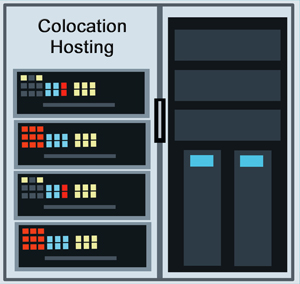Traditionally, having your own data center has been the way to go for medium and larger businesses. It may still be the best answer for your needs. However, there are advantages to moving at least some of your equipment and data to a colocation hosting facility. Let’s have a look at why this might be a great idea.
 Just What is Colocation?
Just What is Colocation?Colocation sounds like it means having two or more operations in one location. That’s pretty much it. Colocation facilities were originally called carrier hotels. Multiple service providers would locate equipment in the same building run by one of the carriers or a third party who provided common services such as HVAC, AC power, backup generator power, and connectivity as needed. It was a way for carriers to easily exchange traffic on neutral turf and not have to each pay for their own building.
Nowadays colocation facilities or “colos” serve businesses as well as carriers. They are still a great way to connect to the Internet with as much bandwidth as you need at the best prices and connect to various carriers who also happen to be in the facility. Compare that with trying to get 10 Gbps or 100 Gbps out in the boonies.
In addition to bandwidth, colocation centers offer rack space, cabinets, cages and the power, cooling and connections to go with them. You generally bring your own servers and storage and take responsibility for maintaining your equipment. Many colos also now offer expanded tech services to monitor and service equipment 24/7 and may even lease you servers and other equipment you would normally buy.
Why Pay Someone Else to Host My Servers?
It may seem logical to keep everything under one roof, but that doesn’t necessarily give you everything you need. For one thing, you have no redundancy in the event of a disaster. A tornado, hurricane, earthquake or flood can wipe out your data center and you’ll be out of business for awhile. If you keep all your backups in the same data center, that could take a long while and very expensive to recreate all the data you need.
By having at least some of your servers and storage offsite, you gain the advantage of redundant facilities. It works even better if your sites are geographically dispersed.
As mentioned previously, you’ll likely find much better connectivity at better prices in a colocation center. Carriers go where many potential customers are clustered so that they can quickly and easily provide service. It’s just a cable run in the colo.
Are you able to provide tech service 24/7? Most colocation facilities have their own tech staffs available round the clock to handle their equipment and often provide a suite of services to their customers.
Think about the cost of expansion. If you are running out of space now, you have a make or buy decision to face. Making means building or leasing a larger facility to accommodate your growing needs, including more backup power, tech support, and security. Buying means avoiding the capital investment in facilities and leasing from a colo, likely at much lower cost that doing it all yourself.
Another area where colos shine is being physically close to your customers to reduce transmission latency. That’s more important if you have latency sensitive real-time applications and if you are selling your service nationwide or worldwide. Some of the larger colos have multiple sites so that you can disperse your equipment as needed.
Is your business growing and creating a need for additional data center capacity or would you simply prefer to lease rather than buy the IT facilities you need? If so, consider the advantages of colocation hosting and get competitive quotes now.

